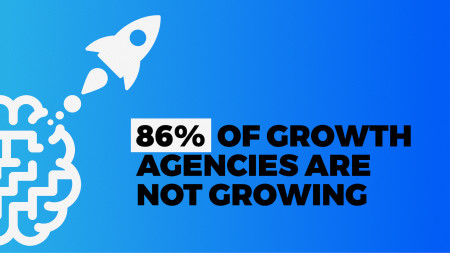86% of Growth Agencies Are Not Growing - New Study By Growth Thinking

NEW YORK, June 23, 2022 (Newswire.com) - A new study conducted by Growth Thinking found that 86% of growth agencies are not growing - the growth hacking service buyers study analyzed 2,150 growth service buyers across 10 industries.
Growth thinking author Nader Sabry studied 2,150 buyers who have purchased growth hacking services more than three times in the past 24 months. The study reveals spending patterns, service provider success rates and return on investment, and switching costs/reasonings.
Some of the key findings in the study are
- 86% of growth agencies are not growing; their top issue is talent,
- $48,241 is the average cost to switch from in-house to external providers,
- 32% of growth service buyers spend $1,000 a month,
- 40% of all service agreements last 3 months or less,
- 55% of first-time services used are from freelancers,
- On average, 8% of growth services are hybrid (digital and non-digital), and
- 72% of growth activities are focused on revenue acquisition
The Growth Hacking Service buyer report goes on to illustrate the difference between freelancers, growth agencies, and in-house growth services. Although growth agencies may be a prominent source for a client to use, freelancers are the first point of protocol when clients dip their fingers into growth hacking. This opportunity helps serve the already massively growing freelancer workforce of 58 million freelancers contributing $1.4 trillion to the U.S. economy.
The study goes on to Growth leaks, essentially underdeveloped parts of a growth system where growth no longer works. As such, the Growth hacking service buyer report found that:
72% of growth activities are focused on revenue acquisition, which is three times more than retention creating a growth leak.
Alongside several other growth leaks; growth agencies are not ready for their clients. The talent pool in the growth hacking industry is scarce, with estimates of 1 million growth hackers needed by 2030, whereas, today, it is estimated around 10,000.
Although talent is scarce, and growth systems are underdeveloped, the growth hacking industry is quickly emerging. Rising from its sketchy history, it is proving to be a viable discipline even for Fortune 500s.
Learn more here: Growth Hacking Service buyer report
ABOUT
Growth Thinking is a design methodology for growth hacking by the bestselling author of Ready Set Growth Hack, Nader Sabry. It has been applied as a book and a $1 million challenge known as the 10-day growth hacking challenge, which has generated $138M in revenue. This methodology has been adopted by universities like Harvard and Stanford, Fortune 500s (Google/Microsoft) and unicorns.
MEDIA CONTACT: Anne Stewart at Press@mygrowththinking.com
Source: Growth Thinking
